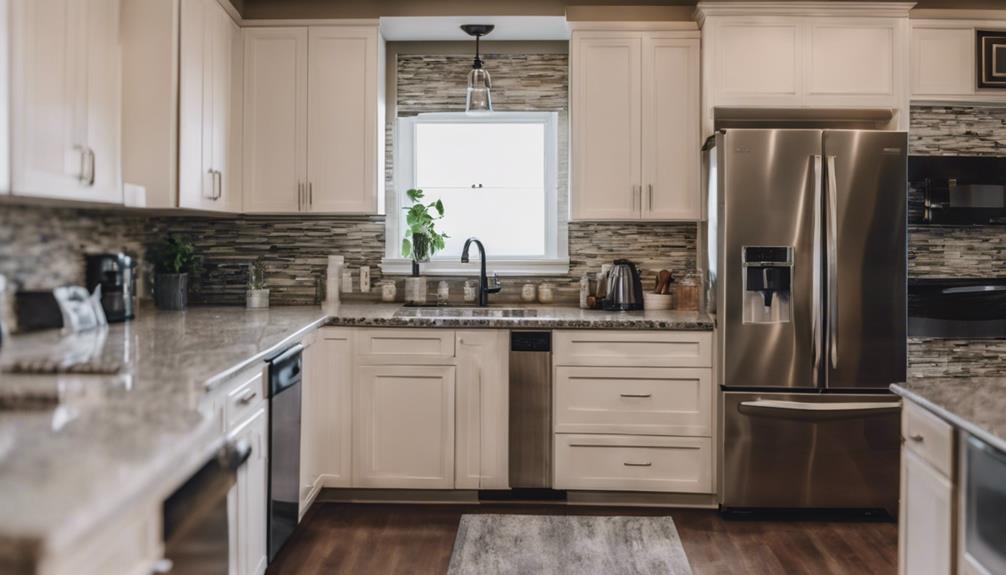How Much for Kitchen Remodel

When considering a kitchen remodel, did you know that on average, homeowners spend around $25,000 on this type of project? The cost can vary significantly based on various factors such as the size of the kitchen, quality of materials chosen, and whether you opt for professional installation.
Understanding these elements is crucial, but what about the often overlooked expenses that can catch you off guard during the renovation process? Let's uncover the mysteries behind the price tags attached to kitchen makeovers and how to navigate them effectively.
Factors Influencing Kitchen Remodel Costs
When planning a kitchen remodel, considering various factors can significantly impact the overall cost. We, as homeowners, must take into account the size of the kitchen. A larger kitchen will naturally require more materials, labor, and time, all of which contribute to the final price tag. The layout is another crucial aspect to ponder. If major changes are needed, such as moving plumbing or electrical systems, the expenses can quickly escalate. Additionally, the quality of materials chosen plays a vital role. Opting for high-end appliances, countertops, and cabinets will undoubtedly raise the total cost.
Furthermore, the complexity of the design shouldn't be overlooked. Intricate details, customized elements, and special features will all add to the overall expenditure. Our lifestyle and cooking habits can also influence the budget. For instance, a passionate home chef might invest more in top-of-the-line equipment, whereas someone who rarely cooks may prioritize different aspects of the remodel. By carefully considering these factors, we can better estimate the costs involved in our kitchen renovation project.
Budgeting Tips for Kitchen Renovations
Considering our financial constraints, we prioritize effective budgeting strategies when planning our kitchen renovations. To ensure we stay within our means, we start by setting a realistic budget based on our income and savings. It's crucial to account for unexpected expenses by adding a cushion to our initial budget. We also research and compare prices for materials and labor to get the best deals without compromising quality.
Another budgeting tip we swear by is prioritizing our needs over wants. By focusing on essential upgrades first, such as fixing structural issues or replacing outdated appliances, we ensure our kitchen remains functional even if we need to postpone non-essential upgrades. Additionally, tackling small DIY projects can help us save on labor costs while adding a personal touch to our renovation.
Lastly, we continuously track our expenses throughout the renovation process to avoid overspending. By keeping a detailed record of every purchase and payment, we can make informed decisions and adjust our budget as needed. This disciplined approach allows us to achieve our dream kitchen without breaking the bank.
Average Cost of Common Kitchen Upgrades
We researched the average cost of common kitchen upgrades to help us plan our renovation budget effectively. Understanding the costs associated with popular kitchen upgrades is crucial for ensuring that our remodeling project stays within budget.
Here are some average prices for common kitchen upgrades:
Upgrading countertops can cost anywhere from $2,000 to $4,500, depending on the material chosen. Installing new cabinets typically ranges from $3,000 to $8,000, but custom cabinets can cost significantly more. A fresh coat of paint may seem simple, but professional painting services can range from $1,000 to $3,000. For those looking to replace flooring, expect to pay around $1,500 to $4,000, depending on the material. Upgrading to stainless steel appliances can range from $2,000 to $8,000 or more, depending on the brand and features. Adding a backsplash may cost between $800 and $2,000, depending on the material and size of the area.
Hiring Professionals Vs. DIY Approach
For our kitchen remodel, weighing the benefits of hiring professionals versus taking the do-it-yourself (DIY) approach is crucial. While the DIY route can save money and provide a sense of accomplishment, hiring professionals offers expertise and guarantees quality work.
When we consider the complexity of tasks like electrical work, plumbing, or cabinetry installation, the experience and skill of professionals can ensure safety and efficiency. Additionally, professionals often have access to discounts on materials, ultimately reducing overall costs.
Choosing between professionals and a DIY approach depends on our skill level, time availability, and budget. DIY projects can foster a sense of pride and ownership, but they also come with the risk of errors that may end up costing more to fix. Professionals, on the other hand, bring years of experience and knowledge to the table, ensuring that the remodel is completed to high standards.
In the end, whether we decide to hire professionals or tackle the project ourselves, the goal is to create a kitchen space that reflects our style and meets our needs.
Managing Unexpected Expenses in Remodeling
Navigating through a kitchen remodel, unexpected expenses can arise, requiring careful financial management. While planning our dream kitchen, we encountered unforeseen costs that tested our budgeting skills. To handle these surprises, we recommend setting aside a contingency fund of at least 10-20% of the total remodel cost. This buffer can cushion the impact of unexpected expenses like structural issues, material delays, or additional labor requirements.
In our experience, it was crucial to prioritize expenses and differentiate between essential needs and nice-to-have upgrades. By staying flexible and adaptable, we could adjust our plans without compromising the overall project. Additionally, maintaining open communication with contractors helped us anticipate potential cost overruns and find cost-effective solutions.
When unexpected expenses arise, don't panic. Take a deep breath, reassess your budget, and explore alternative options to stay on track. Remember, a kitchen remodel is a significant investment, and managing unexpected expenses with prudence and foresight will ensure a successful and satisfying outcome.
Frequently Asked Questions
Are There Any Tax Incentives or Rebates Available for Kitchen Remodel Projects?
There are tax incentives and rebates available for kitchen remodel projects. We've explored options like credits for energy-efficient upgrades. It's important to research and take advantage of these savings to make our project more cost-effective.
How Can I Maximize Storage Space in My Kitchen Without Breaking the Bank?
To maximize storage space in our kitchen without breaking the bank, we can install shelves, utilize vertical space with racks or hooks, and declutter by organizing items efficiently. These simple solutions can help create a more functional and organized kitchen.
What Are Some Eco-Friendly Options for Kitchen Remodel Materials and Appliances?
When looking to remodel sustainably, we can opt for materials like reclaimed wood, bamboo, or recycled glass. Energy-efficient appliances and water-saving fixtures can also help reduce our environmental impact. Let's create a greener kitchen together!
Is There a Way to Incorporate Smart Home Technology Into My Kitchen Remodel?
Absolutely! We can integrate smart home tech into your kitchen remodel. Imagine voice-controlled lights, smart fridges, or hands-free faucets. These upgrades enhance convenience and efficiency, making your kitchen a tech-savvy haven for daily use.
What Are Some Creative Ways to Personalize My Kitchen Design Without Exceeding My Budget?
When personalizing our kitchen design without overspending, we focus on maximizing existing features like adding unique hardware, colorful backsplash, and open shelves for displaying cherished items. It's about blending creativity with practicality within our budget.
Conclusion
In conclusion, it's important to carefully consider all factors when planning a kitchen remodel to ensure you stay within budget.
By understanding the average costs of common upgrades and deciding between hiring professionals or taking on a DIY approach, you can better manage unexpected expenses.
With proper budgeting and planning, your kitchen renovation can be a successful and rewarding project.
